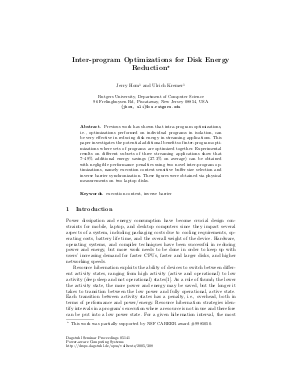Inter-program Optimizations for Disk Energy Reduction
Authors Jerry Hom, Ulrich Kremer
-
Part of:
Volume:
Dagstuhl Seminar Proceedings, Volume 5141
Part of: Series: Dagstuhl Seminar Proceedings (DagSemProc) - License:
 Creative Commons Attribution 4.0 International license
Creative Commons Attribution 4.0 International license
- Publication Date: 2005-11-02
File

PDF
DagSemProc.05141.6.pdf
- Filesize: 383 kB
- 15 pages
Document Identifiers
Subject Classification
Keywords
- Compiler
- inter-program
- optimization
- execution context
- synchronization
- inverse barrier
Metrics
- Access Statistics
-
Total Accesses (updated on a weekly basis)
0Document
0Metadata
Abstract
Compiler support for power and energy management has been shown to be effective in reducing overall power dissipation and energy consumption of programs, for instance through compiler-directed resource hibernation and dynamic frequency and voltage scaling. The multi-programming model with virtual memory presents a virtualized view of the machine such that compilers typically take single programs as input, without the knowledge of other programs that may run at the same time on the target machine. This work investigates the benefits of optimizing sets of programs with the goal of reducing overall disk energy. The two key ideas are to synchronize the disk accesses across a group of programs thereby allowing longer disk idle periods, and to utilize execution context knowledge to allocate maximal buffer sizes. The compiler inserts runtime system calls for profiling the application and disk, uses execution context in allocating buffers, and synchronizes disk accesses with an inverse barrier policy. Data prefetching has been added to mitigate the overhead of synchronization. Experimental results are based on three streaming applications and their subsets. The experiments show that inter-program optimizations can have significant disk energy savings over individually optimized programs. Applying the most aggressive inter-program optimizations result in energy savings of up to 49%, and saving 34% on average.
Cite As Get BibTex
Jerry Hom and Ulrich Kremer. Inter-program Optimizations for Disk Energy Reduction. In Power-aware Computing Systems. Dagstuhl Seminar Proceedings, Volume 5141, pp. 1-15, Schloss Dagstuhl – Leibniz-Zentrum für Informatik (2005)
https://doi.org/10.4230/DagSemProc.05141.6
BibTex
@InProceedings{hom_et_al:DagSemProc.05141.6,
author = {Hom, Jerry and Kremer, Ulrich},
title = {{Inter-program Optimizations for Disk Energy Reduction}},
booktitle = {Power-aware Computing Systems},
pages = {1--15},
series = {Dagstuhl Seminar Proceedings (DagSemProc)},
ISSN = {1862-4405},
year = {2005},
volume = {5141},
editor = {Luca Benini and Ulrich Kremer and Christian W. Probst and Peter Schelkens},
publisher = {Schloss Dagstuhl -- Leibniz-Zentrum f{\"u}r Informatik},
address = {Dagstuhl, Germany},
URL = {https://drops.dagstuhl.de/entities/document/10.4230/DagSemProc.05141.6},
URN = {urn:nbn:de:0030-drops-3086},
doi = {10.4230/DagSemProc.05141.6},
annote = {Keywords: Compiler, inter-program, optimization, execution context, synchronization, inverse barrier}
}
